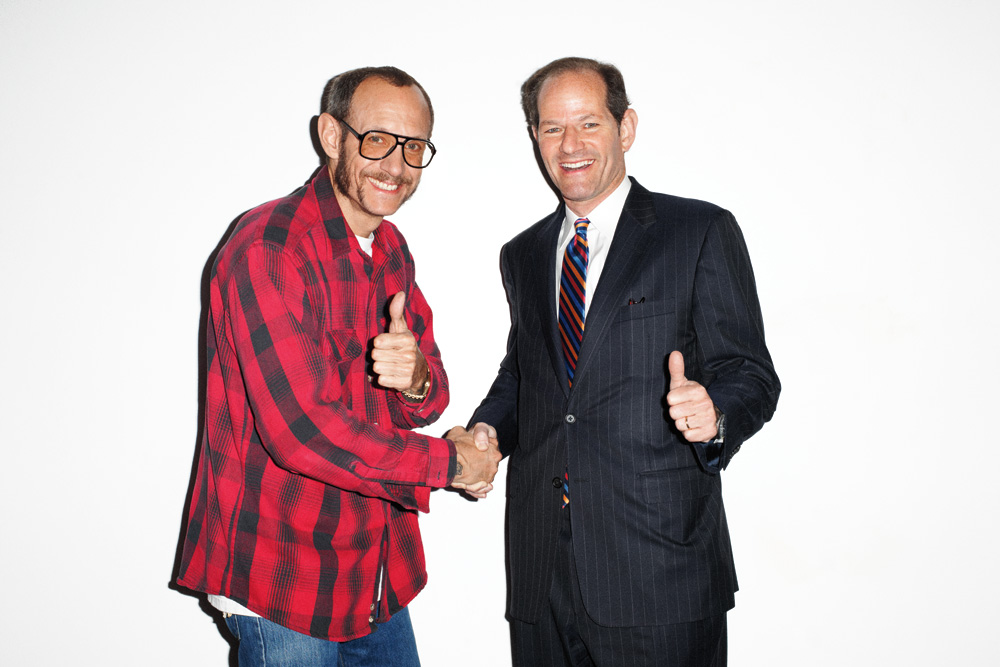Eliot Spitzer

Not too long ago, Eliot Spitzer, the former governor of New York State once thought to be a rising force in the Democratic Party, appeared destined to have the word disgraced attached to his epitaph. In March 2008, Spitzer resigned from office after an FBI investigation revealed that he had been a patron of a high-end prostitution service called Emperors Club VIP-the governor was blithely identified as “Client 9.” In his resignation speech, Spitzer apologized to the people of New York State for his “private failings” and announced that he would step down to focus on making amends with his family. Shortly thereafter, the now-former governor, his wife, Silda Wall Spitzer, and their three daughters returned to their apartment on Manhattan’s Upper East Side as Spitzer’s career in public office-which had begun so promisingly a decade earlier when he was elected the state’s attorney general-came to an end.
About a year ago, though, Spitzer slowly began to reenter the public sphere. He started writing a column on the economy for Slate. And he began giving interviews, addressing the scandal that ended his term-he has never quite moved beyond “private failings”-but also answering questions about some of the systemic problems that led to the current economic collapse and how the government needed to address the culture of Wall Street and financial institutions in general. What made Spitzer uniquely qualified to address these issues was his own history with the subject: While he was still attorney general, he had sued AIG, claiming that the insurance giant (which has since imploded) was using deception and fraud to boost its stock price; he had taken on Merrill Lynch, accusing the firm’s analysts of offering investment advice tainted by gross conflicts of interest; and he had challenged the entire structure of the banking and financial-services industry itself, arguing for greater accountability and cautioning, somewhat presciently, that the predatory lending practices of mortgage companies, unchecked proprietary trading, and certain highly leveraged investment products (those infamous credit default swaps, for example) could lead us down a potentially dark, dangerous road.
The hard-charging aggression with which Spitzer prosecuted financial institutions-as well as environmental polluters and pharmaceutical companies-while he was New York State attorney general played a big role in his sweeping victory in the 2006 gubernatorial election. (Interview even ran a story on him that year under the heading: “He’s gunning to be the next governor of New York-and he’s just getting started!”) Spitzer’s run was fueled heavily by the image that he was a populist crusader, even though he himself came from a world of privilege: His father, 85-year-old Bernard Spitzer, is a self-made Manhattan real estate baron, and the younger Spitzer attended Princeton and earned his law degree from Harvard, where, in 2005, he delivered a now semi-ironic graduation address during which he warned the leaving class about the dangers of hubris and referenced Tom Wolfe’s Bonfire of the Vanities.
Spitzer had run into difficulties as governor, though, before the prostitution scandal even hit. He had become a divisive force among state politicians after running on a reformative pledge to “change the ethics of Albany.” Upon his swearing in, he was met with immediate resistance when the state legislature rebuffed his choice for a new comptroller. His campaign to allow illegal immigrants to obtain driver’s licenses crashed and burned. He also became embroiled in what would come to be known as Troopergate, when he was alleged to have abused his authority by ordering state police to create records tracking Republican State Senate Majority Leader Joe Bruno’s whereabouts, which were then released to the media. (The governor’s office was later cleared of any wrongdoing.) The prostitution scandal that forced Spitzer to resign is not the kind of thing that ever fully recedes from memory, but the history of American public life is filled with second acts-and Spitzer appears to be in the early stages of crafting one for himself, even if his days running for political office are behind him (and many aren’t sure that they are). I met him on a recent Friday at his father’s office in midtown Manhattan, which looks north toward Central Park and has served as his base of operations since he resigned as governor. We sat at a table in the corner, and he fixed himself a cup of coffee.
STEPHEN MOOALLEM: Over the last year, you’ve kind of slowly reentered public life. And while
the conversation early on obviously focused on the prostitution scandal that caused you to resign, you’ve very quickly emerged as a sort of reasoned voice on some of the issues that we’re facing with the economy and the recession. How would you characterize your reentry into that arena?
ELIOT SPITZER: You know, I wouldn’t characterize it… I would very honestly just tell you that what I tried to do was simply respond to inquiries from people as they came in. Where I’ve thought I could say something useful, I’ve tried to add a voice that was, frankly, a dissident voice earlier on, but one that I think has become a more mainstream voice-and not because I’ve shifted. I think that the critique I had of what was going on in our financial system from six, eight years ago-after seeing some of what we’ve suffered through and even since the cataclysm itself-in terms of the structural changes… I don’t want to suggest causation, but some of what I was saying at the time, which was then viewed as a bit edgy, perhaps-that is now the perspective of people like Paul Volcker [former chairman of the Federal Reserve and current chairman of the Economic Recovery Advisory Board] and Mervyn King [economist and governor of the Bank of England] in terms of how we need to fundamentally change the banking system. So all I’ve tried to do is answer some questions. I don’t have any particular expertise-I’ve never been a banker or an investment banker. But I did see an evolution in the system that I thought was problematic.
MOOALLEM: Was there a moment when you made the conscious decision to put yourself out there again? You had to know that doing so would require you to answer certain questions.
SPITZER: Well, you recognize that either you’re going to disappear for the next 30 years, which is one option, where you say, “I’ve had a chapter in public life, but now because of this I will just fall off and be purely private.” Or you say, “I’m willing to venture back into the public sphere.” But when you do that, whether it’s now or five years from now, these questions will have to be asked. Look, I’ve never been one to hide. I like to think I’m also not one to believe that I have something so remarkably special to contribute, that I have some right to be out there, or that anybody is
necessarily going to be interested. I think the first TV interview I did was on CNN with Fareed [Zakaria, which aired on March 22, 2009]. I tried to pick venues that would be both thoughtful and respectful and where we could discuss the issues. I knew they would ask what I understood were necessary questions about what had happened and why I needed to resign. But that, to some extent, is the reason I can now have conversations in various venues where the issue doesn’t come up-because I’ve answered the questions. At a certain point, it’s like, “Okay. Now what?” But there was no moment when I said, “Now I’m ready to reengage.”
MOOALLEM: What was that first day like after you resigned? How did you approach something like that?
SPITZER: It’s terrible. You can’t overstate how difficult it is to give away that opportunity. And there are many things that disappear when you step out of the public life. To state the obvious, the beautiful thing about our system is that inevitably everybody goes through it. Nobody stays there forever-maybe Mike Bloomberg will when he’s running for his 15th term. [laughs] But it was very
difficult for all the obvious emotional reasons, and also because I do care about trying to have an impact. The last year and a half has been a sequence of transformative moments, not only in terms of banking, but also in terms of the whole ideological conversation about what government should do and can do, and it’s frustrating not to be able to be a more active participant in that debate. So you try to ask yourself, How else can I do something that will provide both an intellectual outlet for me and give me some opportunity to be heard? That’s why I started to write. But that first day… It’s very difficult.
MOOALLEM: What was going through your head at the time as far as what you were going to do next?
SPITZER: I resisted the urge to figure it out then, just as I resist the urge to figure it out now. I think life is a series of fortuitous… Look, I was extraordinarily lucky on many levels. In 1994, when I first ran for attorney general, that was really the first time I thought about running for office. I was not one of these kids who said, “I must be in politics.” That’s not how I grew up. But I loved the substance of it. I thought maybe I would be appointed to something if I was lucky-that I could be some assistant secretary of the State Department or a justice, depending on where my life went. So I don’t believe in having a 30-year game plan-they don’t work very often. The other thing, to state the obvious, is that if you go through what I went through, you focus a lot on your family. I have three daughters. I like to think that we’re a very tightly knit family and have survived something that applied some really tough moments of stress-and that has got to be what you think about first. That’s a lot more important than whether I write an article or go on a TV show or get back into government or any of those things… It sounds like a Hallmark card, but it matters a lot more than the rest of it.
MOOALLEM: I don’t want to ask you to psychoanalyze yourself or break it down in any way, but as attorney general, you took on these financial institutions and drug companies and polluters and politicians and you took them all on very aggressively. Obviously, you accomplished a lot by doing that, but one would assume that you probably also made a few enemies along the way. When you’re in the kind of position you were in, does it get harder and harder to kind of get up every day and go to work with the knowledge that there are people out there who have their knives out for you and are just waiting for you to slip? Can it make you a little edgy or paranoid?
SPITZER: What’s the old saying? Just because you’re paranoid doesn’t mean they’re not out to
get you? [laughs] You try to keep your sense of equanimity and keep the compass pointed in the right direction. There’s no question, when I was AG and governor, you know, I think it’s pretty clear… Enemies isn’t the word I would use…
MOOALLEM: Okay, but there were people who were unhappy with you.
SPITZER: [pauses] There were some powerful sources who thought I was improperly inflicting harm on them or their businesses. Obviously, I think everything that we did was correct. But, yeah, there are some folks who were out to harm my political career, and that’s fine-that’s their right. Did they do some things that maybe I wouldn’t have done? Maybe. You know, this is a tiny little footnote of an issue, but AIG was offering people $25,000 to go on TV as supposedly neutral experts just to trash me, all right? But that’s fine. You know that’s going to happen, that this is
a game of significant interests that compete against each other. You just try to deal with it and say, “What is the right thing to do?” My job is just trying to figure out what that right thing to do is.
Yeah, there are some folks who were out to harm my political career, and that’s fine-that’s their right. Did they do some things that maybe I wouldn’t have done? Maybe.Eliot Spitzer
MOOALLEM: Do you on any level feel like that played a role at all in your ultimate-
SPITZER: A role? I’m sure. I’m sure it did. But that doesn’t matter to me. I’ve been very clear about where I’ve failed, and that is… [pauses] sufficient for me. You know, did they play a role? I’ll let others worry about that. It doesn’t matter.
MOOALLEM: What about since you’ve been out of office? How have people generally been with you?
SPITZER: Well, I’ve always said that people are essentially well-meaning and have open and good hearts, and there’s forgiveness in most of us. There’s the schadenfreude of sort of relishing in the
celebrity’s fall from grace, which is a very real part of the culture and drives tabloid headlines. But I think there is that dichotomy. People on the street have always been supportive and have said, “Look, you have tried through your public career to fight on behalf of the public, and we wish you well in that regard.” The rest of it, you know, we’ll deal with.
MOOALLEM: It’s interesting, though, because a lot of the stuff you did when you were attorney
general was viewed as populist. But then I’ve heard you say that you don’t believe in populism.
SPITZER: Well, it’s very hard to be a passionate moderate, because the energy and the adrenaline flows more when you’re the screaming libertarian or the angry populist who attacks the ramparts of capitalism. I actually believe in capitalism. But I don’t think The Wall Street Journal has the foggiest idea of what capitalism is all about. They don’t understand what markets are and how they work. I believe that for markets to work, you need a government that brings enforcement actions and sets parameters the way we were trying to when I was AG. It was part of a much more nuanced argument that I was trying to make when I was governor about what government should do. But populism, which is driven by anger, isn’t going to get us to the point where we actually create jobs or wealth for people. It’s a visceral response. What we need is a more sophisticated understanding of how the economy really works-and the caricature that’s put forth on The Wall Street Journal‘s editorial page is just as wrong as the one put forth by the angry populists.
MOOALLEM: But wasn’t marshalling that anger and using it to sort of galvanize people part of
what you were doing when you were attorney general? You used the media to do that a lot.
SPITZER: Yes. I don’t think there’s any question that, to a certain extent, the public support that resulted could legitimately be viewed as sort of a populist response to the fact that, hey, Spitzer’s going after these big guns on Wall Street. But I was always very clear to say, Look, I believe in
capitalism. I believe in the market. I believe, even when it comes to the executive-compensation issue, the answer long-term is to have the owners and shareholders do it with a proper structure in a market that is a real market, and not have some bureaucrat in Washington, D.C., making decisions. So I’ve been very clear that I believe in a market-driven system. In some of the cases, I got portrayed as the “Sheriff of Wall Street” or this and that-and, yeah, that plays into an imagery-but I’ve always tried to make clear what it was and what it wasn’t.
MOOALLEM: In retrospect, some of the things you were beginning to identify as attorney
general-some of the cases you took up that at the time seemed spectacularly crusading-now seem almost coolly right-headed.
SPITZER: It seems terribly obvious. Afterward, there’s this eureka moment, and you say, “Well, of course. How could anybody not have seen that?” What we did, the first big Wall Street case-we had done some before, but they hadn’t garnered any significant attention-was about analysts and Merrill Lynch and the civil structure of each of the major investment banks. I said, “This captures the essence of the tension within our financial system, and it’s fundamentally problematic.” But people didn’t want to hear it because things appeared to be going pretty well-you know, bubble after bubble.
MOOALLEM: It’s probably difficult to put it down to one thing, but can you point to something that you accomplished either as attorney general or as governor where you can say, “This is something I’m really proud that I got done in office”?
SPITZER: Well, I’ll give you a theoretical. On a theoretical level, I think I contributed to the
argument that government mattered-and that enforcement against untoward behavior in the
private sector was an important and positive role of government. As obvious as that sounds now, it wasn’t an accepted point when I started as AG. I think I tried to make that argument both by the individual cases we made and by weaving a theory behind it. And I think now people understand that, yeah, we need government not as a regulator, but as a market facilitator-to make the markets work. So that’s a broad theoretical. I think whether it’s the environmental cases or the Wall Street cases, if I had to give you a particular decision . . .
MOOALLEM: It doesn’t have to be the thing-just something where you’re like, “I’m glad I got that done.”
SPITZER: Oh, I’ll give you one: the below-wage labor cases, where we went to court on behalf of workers who were being paid way below minimum wage and got them their legitimate wages. For these people, these checks were life changing. . . . It was a real joy to make those cases and make them successful.
MOOALLEM: When you were in office, I noticed that a lot of people would ask you to identify your biggest mistake, and your response was very often the same: “I could, but I won’t.” [Spitzer laughs] But now that you’re no longer in office or running for office, what do you think-
SPITZER: Well, I think the answer to that question is pretty obvious now.
MOOALLEM: But I was going to say, aside from the obvious one, what would you say was the biggest mistake you made while you were in office?
SPITZER: [pauses] Well, I’ll give you one example: our driver’s-license effort, which clearly didn’t work. I think we were right on the substance of it, but it didn’t work. There was a situation where I completely underestimated the depths of the political opposition, and that, for some time, derailed our agenda. The other thing that derailed it was the stupidity that they called Troopergate, which was Joe Bruno and Roger Stone [the Republican strategist and a top adviser to Bruno] figuring out how to turn back the very real issue of his abuse. I mean, [Bruno] is now indicted for taking millions of dollars under the table-he was abusing things left, right, and center! And we didn’t figure out how to lance that boil early and effectively.
MOOALLEM: Is there anything you would’ve done differently as far as how you approached being the governor?
SPITZER: The question is “Was I too hard and antagonistic with the Legislature?”
MOOALLEM: Well, do you feel like you were?
SPITZER: You know, I tried very hard to work with them and to push them. . . . Could we have tried to be more accommodating? Perhaps. But I don’t think it would have mattered. If anything, I think the critical issue was that we needed to get control of the New York State Senate. Joe Bruno was controlling it, and that was fundamentally adverse to the public policy. But we made real progress. The fact that we were able to get reform with the Rockefeller drug laws, or change the budgetary priorities, or make big progress with same-sex marriage-which, you know, isn’t the first or the most important issue in terms of the economy, but matters. We will be able to make progress on those issues because we made it our specific determination to reclaim the state Senate-and that is what led to many of the battles with Joe, which were inevitable.
MOOALLEM: How do you feel about the Obama administration asking your successor, Governor David Paterson, not to run in the next election?
SPITZER: Well, I thought… [pauses] I thought the White House overstepped a little bit. The easiest answer is they didn’t handle it terribly well. It just wasn’t rolled out well, it didn’t play well, and I think most people saw it as a little ham-handed in the way they did it. Putting that aside, should they have done it? I think it was both premature and really not the right thing to do at that time. David is not in great shape himself with the public. People can discuss why that may be, but I don’t think it was right for the White House at that point, a year ahead of the election, to basically try to push him out when he was trying to govern the state and making tough decisions in a budgetary context, when you need a strong governor to guide things. It seemed they were putting politics ahead of governance in a way that bothered me-and I think it bothered people in the state. They didn’t step in and say, “Hey, can we help you here? You’ve got a tough budget.” And I don’t mean by just giving more money. I mean saying, “What can we do to help the State of New York?” But getting involved in politics… Why? I thought it was premature and wrong.
MOOALLEM: What do you think of what the Obama administration has done so far in addressing the economic recovery?
SPITZER: Well, it’s been a little too status quo for my taste, looking at both health care and the
financial system, which have been the two sectors that have received the greatest attention. I think we are rebuilding the financial system with the same edifice. We are rebuilding the same too-big-to-fail institutions without saying, “Wait a minute, if you get a federal backstop and have access to government money implicitly, then you’ve got it. But we’re not doing that so you can set up proprietary trade and then private equity funds overseas-we’re doing it so you can
actually invest in our economy, in mortgages, et cetera.” So I don’t think we’re doing enough there. On the health-care side, I’m a little worried. We haven’t really confronted cost. If we get 15 or 20 million people insured of the 47 or 50 million who are uninsured right now-who knows what the precise number is-then that’s a good thing. But we haven’t really looked at the change that will be required in the delivery system of health care, and that’s where costs have to be confronted. Nobody has really answered that question. Nobody really even really wants to ask it because despite all of the complaining about the problems in our system, it is an amazing system driven by technologies that are absolutely spectacular. But they cost a bloody fortune. You know, a relative of mine, 79, just went through a triple bypass, or my dad, who a year and a half ago was in the intensive-care unit for a bunch of weeks… The amount of attention we can give to people, and the technologies we have to resuscitate them are spectacular. But they cost a lot of money, and I don’t know if we have a way to control that-and I’m not sure that we necessarily want to. We’ve just got to figure out how we can pay for it better.
MOOALLEM: It’s difficult, though, isn’t it? Because there’s this constant tension between trying to change the status quo and then the larger consensus building that’s needed in order for there to be any kind of move forward.
SPITZER: But you have to know how to read that consensus. I think that, to an extent, there is now an alternative storyline emerging, but it isn’t emerging because the White House is leading an effort to build it. It’s not as though the president has been out there saying, “We need to change the financial service sector in a fundamental way. Here’s how.” It’s because of dissonant voices like Paul Volcker and Mervyn King and Joseph Stiglitz, Paul Krugman and other outliers who are saying, “Wait a minute. This is wrong.” So, yeah, it takes time to build that coalition. It’s hard. But I don’t think they’ve played a leadership role in it.
MOOALLEM: As a president or a governor, can you really be a dissonant voice?
SPITZER: Sure you can. In fact, the people who were the most transformative often have been, right? FDR, Teddy Roosevelt. The ones who are often referenced during an election. You know, there are the moments when you want an Eisenhower. . . .
MOOALLEM: But there also are many who are not referenced during an election. You could say, for example, that George W. Bush was a dissonant voice.
SPITZER: Right. Okay. Fair point. He was a dissonant voice, and we disagree with him. But you can be a dissonant voice if you’re willing to bend. Now, you can’t be a dissonant voice on every issue. You need, as Bill Clinton always says, to govern from the center. That’s true. But you also have to know when to push aggressively to create a different consensus.
MOOALLEM: It’s interesting because if you’re a doctor or a lawyer, you can point to concrete things that demonstrate that you’re good at what you do. But what makes somebody a good politician?
SPITZER: Well, politicians serve different purposes. Being an effective president, to a certain extent, requires being an effective preacher. We’re electing a minister, a rabbi, a priest, as much as anything else. We want somebody who can be our representative, who can soothe us when necessary, who can explain our national purpose, and who can guide us basically in the right direction-which is why Barack has such remarkable skill. His speeches serve that purpose beautifully. Bill Clinton was great at it. Jimmy Carter wasn’t. Jimmy Carter laid out policies that we now look back at and say, “Gee, that actually made sense.” But you also need to explain it and convey and communicate in a way that provides that tableau, that understanding.
[Ronald] Reagan was great at it. Substance aside, communication is critically important when you’re in that executive position-certainly the presidency, less as mayor. I don’t think Michael Bloomberg would say that his greatest skill is delivering the speech. He would say he’s more of a nuts-and-bolts mayor-picking up the trash, dealing with the school system. But at the end of the day, Barack will be judged on what does happen to health care. Did we insure more people? Did we control costs? Two easy metrics that will be important. Did we create jobs? There are certain variables that can be measured. When you’re in office, there are tangible moments when you can see tangible successes.
MOOALLEM: I’ve heard you talk, though, about how some people think of politics as a profession, while others think of it as a cause.
SPITZER: Right, right.
MOOALLEM: But when you think about the notion of a political career, it’s almost antithetical to the idea of conceiving of it as a cause, isn’t it?
SPITZER: Unless you have a career that’s of limited duration. I never… [pauses] My career was obviously cut shorter than I wanted it to be. But I did think that if I could serve, ideally, eight years as governor, then I could try to turn the SUNY system around and use it as a way to revitalize upstate and begin to redirect the economy and control health care and insurance… I mean, those would have been real successes, and I would have been happy.
MOOALLEM: When the whole prostitution-ring scandal hit, how quickly did you arrive at the decision to resign? Did you ever contemplate fighting it or maybe kind of working through it?
SPITZER: It’s something I haven’t spoken about a lot… [pauses] The only thing I’ll say is that, in that moment, the only thing that I was going to care about was my Family. And I think I did the right thing on that one.
MOOALLEM: I know you’ve been asked this many times before, but here, definitively, are you going to run again for public office?
SPITZER: I… You know, there are a lot of ways to contribute. I’m trying to do things that are helpful. It’s not something I’m planning on. It’s not something that I have any burning desire to do. So the answer is… Am I planning to do it? No. Would I definitively say I never will again? I guess, you know, you don’t say things like that either… Obviously, I’ve done it before… But it’s not as though I’m sitting here saying, “Gee, my goodness. How do I get back in there?” That’s not where I am right now.
MOOALLEM: I want to read you a quote: “Shame is a great motivator. People say to me sort of critically, ‘Aren’t you trying to shame some of these companies into doing things?’ To which my answer is, ‘What’s wrong with that?’ Shame only works when there’s a recognition you’re doing something wrong.” You said this to this very magazine three-and-a-half years ago, when you were running for governor. Do you still think that’s true?
SPITZER: Sure, absolutely. That’s what… [pauses] Yeah, I think I’ve seen it from every side. You know, this is one of the great ironies in life for me. It’s, uh,… I think it’s a fair statement.






